To celebrate Advocacy Awareness Week 2024, we’re sharing a blog from Nicola Grove, founder of Open Storytellers and Storysharing.

In this blog Nicola tells us why small personal stories are so important in advocacy.
Rix Inclusive Research is working with Local Authority partners to trial the use of Rix Wiki software with children and young people in care. In this exciting project, we have worked with Local Authority Virtual Schools in Medway and Newham.
In England, every young person in care is required to have a Personal Education Plan (PEP). This plan records what is going well in school and what things could be better. It clearly sets out targets and ambitions for the year ahead. The young person usually inputs to this plan via a written document, often responding to questions like ‘What is your favourite subject, and why?’
In our project, we explored how young people could answer these same questions, but via a Rix Wiki as an alternative to a written document. In a Wiki, you can respond with voice, words, photos and videos. It’s a fresh way to have your opinions and views heard.
I loved the fact that it had all forms of media. I could record my voice. I could take a picture. I could type as well.
Secondary aged student in a Medway school
The initial feedback from the professionals in the Children in Care teams has been fascinating. Young people appear to enjoy using Rix software and are proud to showcase what they can do and what they have achieved.
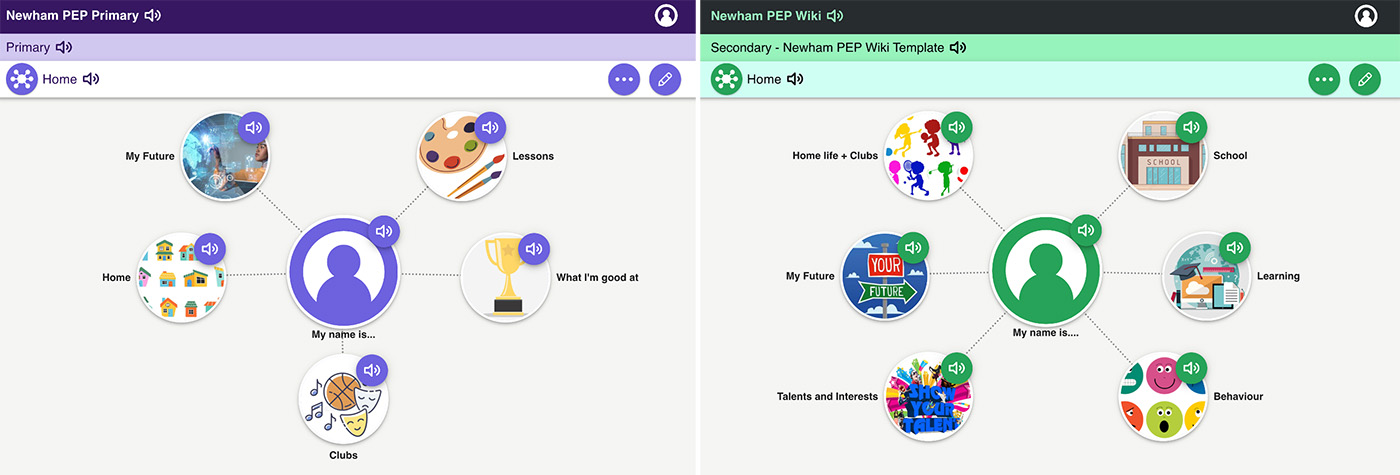
Paige Alcot, our research assistant on the project, reflected on the evidence and outcomes from the work with the students.
After working on this project, I noticed a few universal successes, like children feeling empowered in their self-expression and excited to show those around them what matters most to them. These sentiments were echoed by the people who provide them with one-on-one support, being able to relate what the child added to their Wiki to experiences they’ve had working together in the real world. Overall, the Wiki does a great job of providing a holistic picture of the individual dictated by their vision, giving each child a voice.
In the next part of the project, we will be exploring how the Wiki worked during the PEP meeting – how social workers, teachers and carers reacted to hearing the child’s views and hopes and dreams in their own words.
So this makes me feel better because people get to hear what I need to say without me feeling uncomfortable.
Secondary aged student in a Newham school
This project has been funded by the UEL East London Impact Scholars Award (ELISA).
The project is led by Craig Wilkie with support and guidance provided by Paige Alcot, Ajay Choksi and Prof. Janet Hoskins.
We have used the term children in care in this article. Some local authorities and organisations may use the term looked after children.
The British Science Festival is an annual event celebrating scientific innovation and, as part of the 2024 festival, offered attendees a unique opportunity to step into a futuristic university campus through the power of virtual reality (VR).
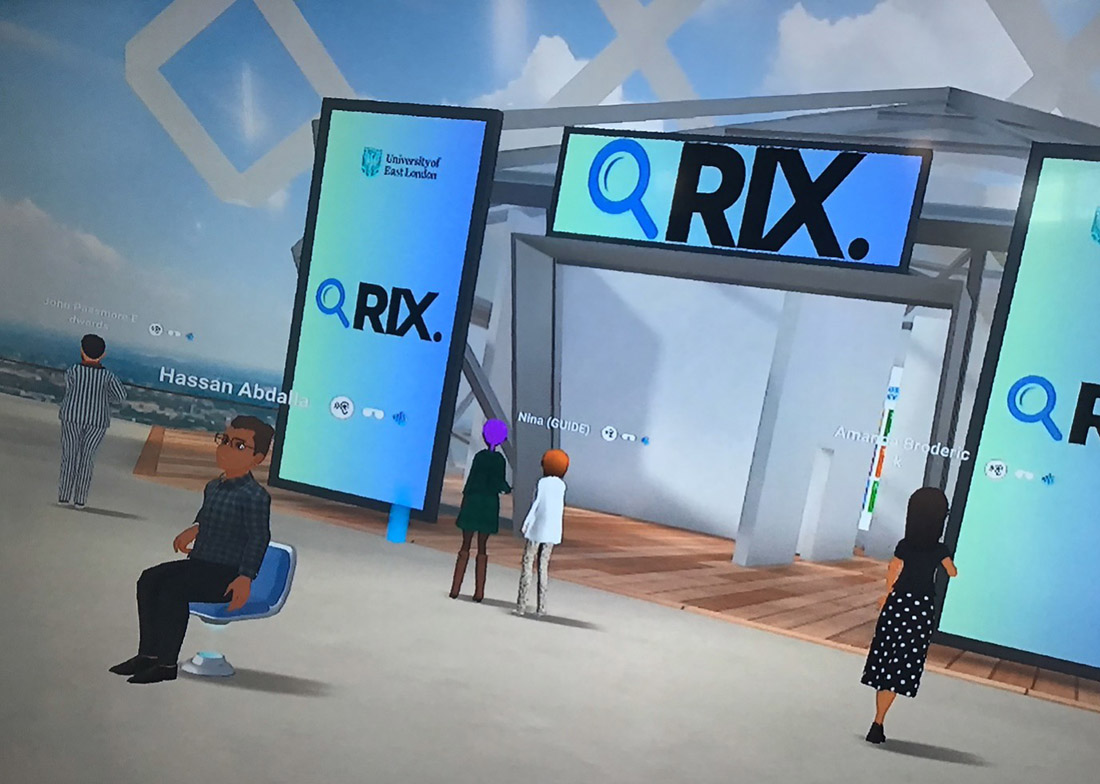
The University of East London (UEL) hosted a VR experience that transported visitors to a reimagined campus, showcasing some of the possible VR technologies that could transform the way in which we work in the future.
The VR experience was developed in collaboration with Kabuni, a VR specialist company, who provided an immersive simulation of a UEL campus of the future. Participants used VR headsets and were instantly immersed in a world of futuristic buildings, interconnected by green spaces and were given a guided tour of part of the virtual campus.
For many, the first experience with VR is a bit of a mind-bending journey. As they slip on the headset, the real-world fades away, and is replaced by a virtual world. The initial reaction is often a mix of awe, disbelief, and a touch of fear.
The most immediate impact is the visual spectacle. The user is surrounded by a 360-degree virtual world, with stunning graphics and realistic details. This can be overwhelming at first, as the brain struggles to process the amount of information.

Participants were issued with virtual reality headsets and controllers, the latter which allowed them to navigate around the Metaverse, interact with objects and a variety of other actions such as teleporting and drawing on a virtual whiteboard. The experience included a guided tour of the imagined campus, but with scope to explore the many displays, including a virtual Interactive whiteboard.

Visitors to the BSF events could get an inside view the VR experience without having to use a headset, as there were TV monitors connected to one of the VR headsets that could show the inside of the virtual campus.
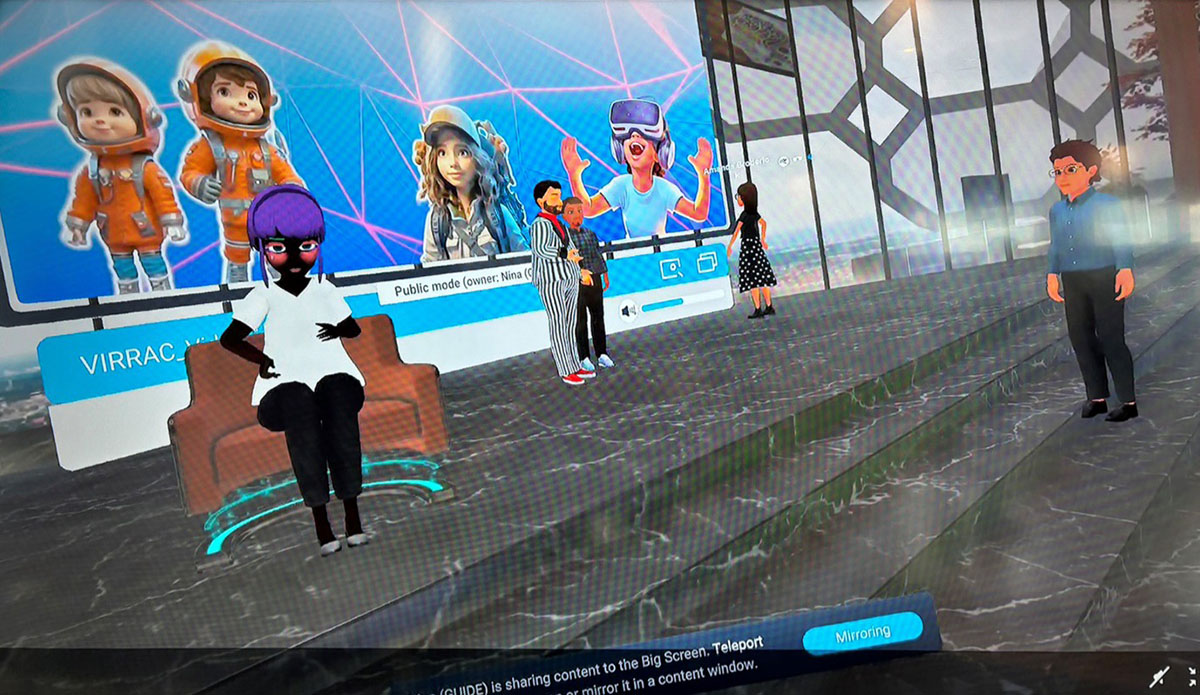
Through interactive displays, visitors could learn about some of the latest research being conducted within the Royal Docks Centre for Sustainability, including Rix Inclusive Research and Purple STARS, Children’s Experience of the Metaverse: Visiting Mars and Chasing Dinosaurs, Travelling through social prescribing, Children and Young People experiences/response to youth violence and Come let us play Steps and Chutes.
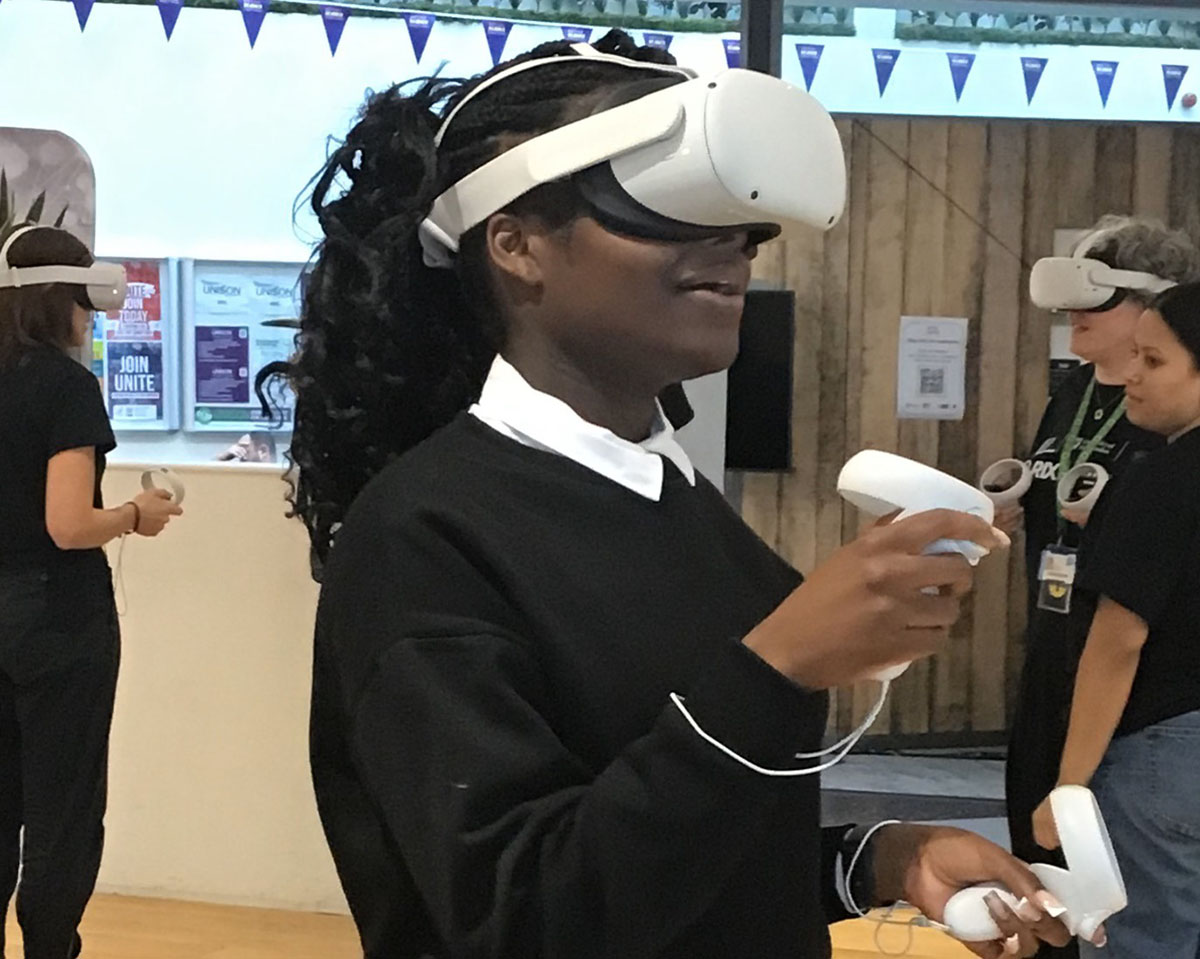
As VR technology continues to evolve, we can expect even more immersive and realistic experiences. With advancements in hardware, software, and content creation, the metaverse will become an increasingly accessible and exciting part of our lives.
The Rix team lead a workshop on Inclusive Approaches to Theory in Higher Education at this year’s BERA Conference, hosted by the University of Manchester.
Our Rix team ran a workshop about the Big Ideas project. In this project we work with the Open University and the universities of Leipzig and Koblenz in Germany. We run online sessions for self advocates and inclusive researchers, exploring theories and ideas that are important for people with lived experience of difference/disabilities.
Ajay and Nicola presented the workshop, supported by Craig and Janet.
We had 12 fantastic participants and together we looked at capability theory, an approach developed by Amartya Sen and Martha Nussbaum.
During the workshop we thought of some games to help us understand some of the key principles. For example, a shopping game to look at barriers to healthy living, an obstacle course to explore physical and sensory ways of experiencing the world, smells, movements and sounds that express feelings, and a breakfast show styled interview with a tree, a stream, and the air, to explore respect for nature and the environment.
We came away with lots more resources for our workshops, and inspired by all the people who joined in.
We are running two interactive sessions as part of the British Science Festival 2024, hosted by the University of East London.
These sessions offer unique opportunities to explore cutting-edge topics and contribute to important discussions.
Wednesday, 11 September 2024
10:30 am – 5:00 pm
University of East London, Docklands Campus, East Building, 4-6 University Way, London, E16 2RD
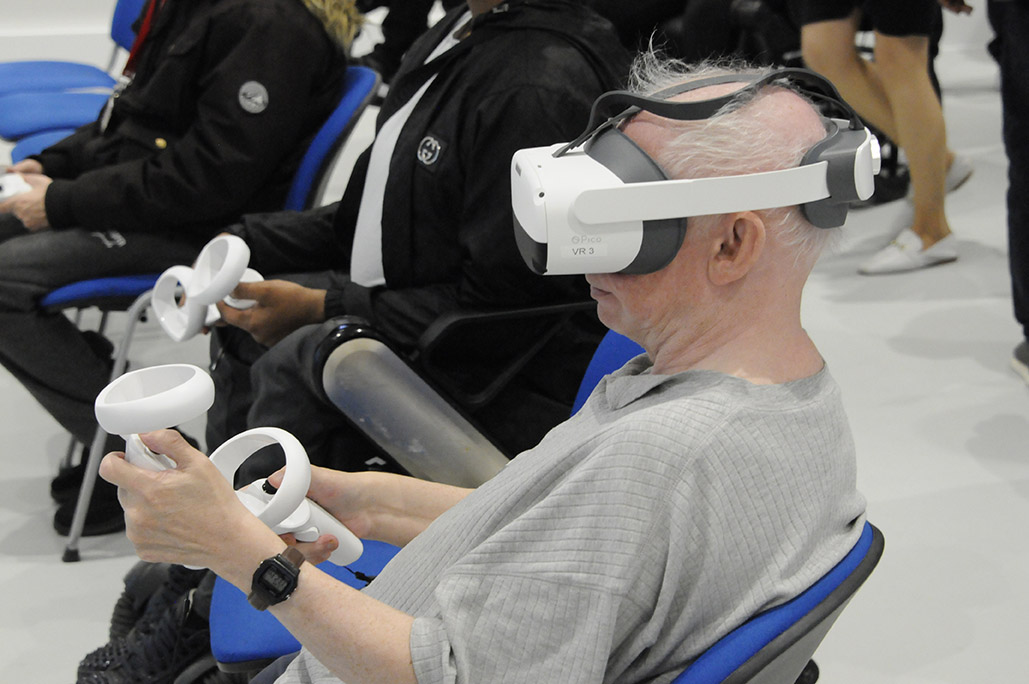
Explore our immersive virtual exhibition and step into the future.
Saturday, 14 September 2024
12:30 pm – 4:30 pm
Stratford Library, 3 The Grove, Stratford, London, E15 1EL
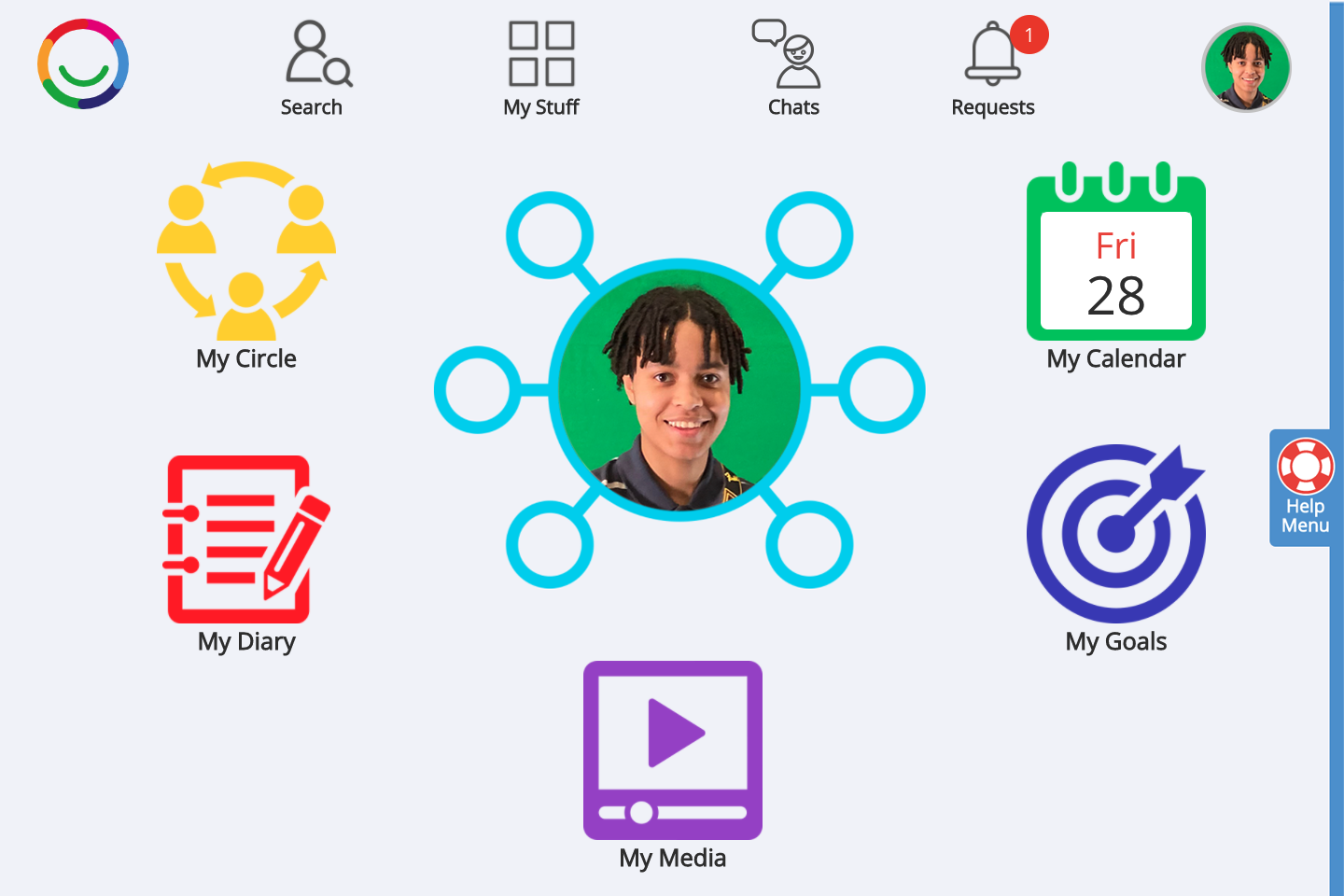
Join us in co-designing solutions for a more connected world.
We look forward to seeing you there!
The Rix Inclusive Research Institute at the University of East London (UEL) organised a hackathon this month at the Royal Docks Centre for Sustainability to identify and solve 20 challenges that people face in the health and wellbeing sector.
Gosia Kwiatkowska, Director of the Rix Inclusive Research Institute welcomed the event as an opportunity for collaboration. She said, “I felt excited, motivated, elevated, it was such a fantastic event. It was lovely to see so many people with different experiences talking about barriers and challenges – then to see people working on those problems and sharing solutions. I’m looking forward to working with the people who attended today to address these problems in the future.”
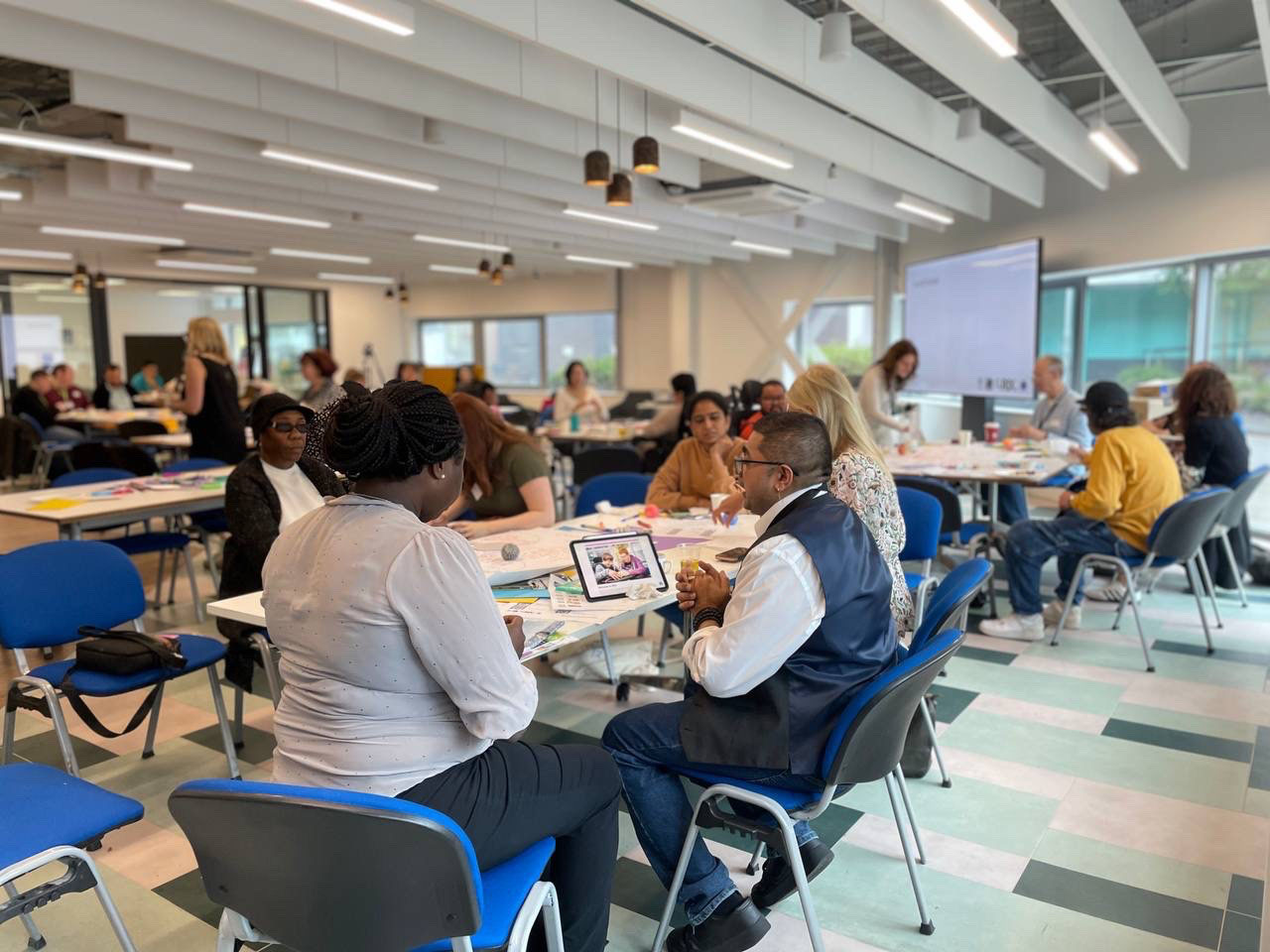
The fun, inclusive and solution-focused event featured interactive workshops where people with different life experiences worked together to share their ideas. Participants included Rix co-researchers, UEL students and staff, and people from the wider community.
Robin Pickering, Design Engineer at Goya Design studio participated in the event and enjoyed the sessions to solve problems, work as a team and meet new people.
I’ve never worked in such a diverse space before, the event has been exciting with each of the sprints having lots of breaks to give us time to think and imagine.
The challenges tackled at the hackathon included helping people through the ticket barriers at stations by re-imagining their design and improving housing access and adaptations through a dedicated mobile phone app to provide guidance and signpost services.
Craig Wilkie, Research fellow at the Rix, explained the importance of co-participation for research into these types of events.
We achieved our objectives – to plan and deliver an inclusive hackathon event. We can’t find any research about similar events, so we feel that we have found something very special here. Working with people who have lived experience of disability to solve problems in partnership and overcome challenges together.
During the afternoon, each team presented their challenge and solutions. The winning team and runners up won a prize of gift vouchers.
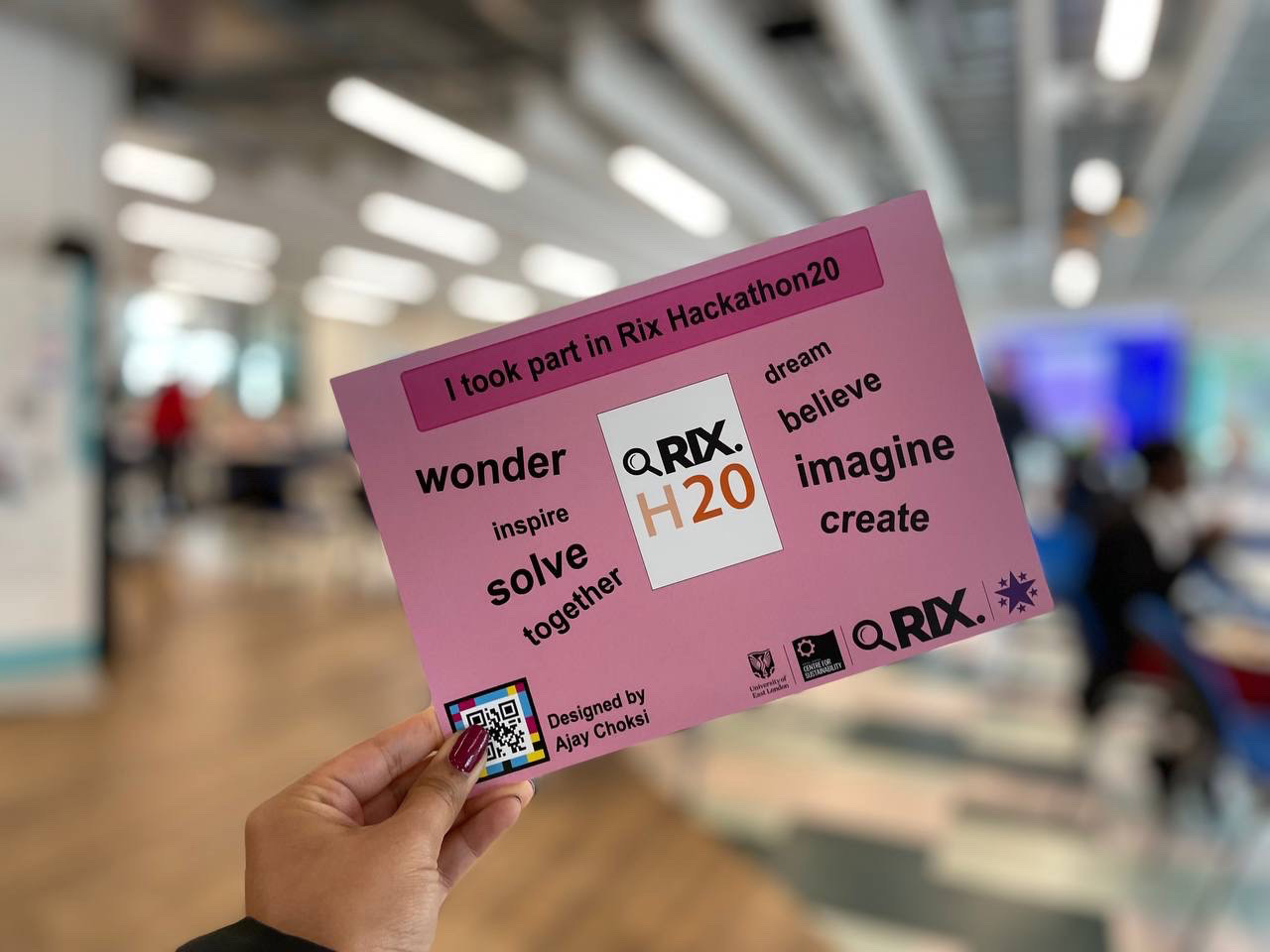
The winning team designed a fully autonomous ramp that allows people to move easily between a platform and the train carriage. People with disabilities usually need to request a ramp 24 hours in advance. Their concept meant that anyone could spontaneously travel by train, summoning the ramp from their phone. Designers and artists even imagined personalising the ramp with colours, LEDs and music.
The Rix believes that some of the biggest challenges people face can be overcome with solutions that are closer to home than we thought possible.
By exploring these solutions, the Rix team attendees contributed to a more inclusive society, where people’s lives can be transformed, and businesses and organisations can deliver better, more efficient services.
Hear from the participants themselves by visiting the Hackathon20 Wiki.
The hackathon was supported and funded by the Centre for Wellbeing Community and Inclusion at the University of East London.
In a collaboration with Nottinghamshire County Council’s Virtual School, Rix Inclusive Research provided technology and expertise to give students a taste of Japanese culture.
As part of a year-long Japanese-themed literacy project to close the gap between a marginalised group of learners and their peers, students created a Japanese building using EON-XR software. After designing the building, they added background music, inspired by Japanese soundscapes. The music was created in a professional recording studio with world-renowned artist David Wise, composer of the music to countless iconic Nintendo games like Donkey Kong Country.
In a special summer celebration of the project, the students eventually viewed their creations in Newstead Abbey’s Japanese garden, where they could stand in the shot, alongside the building they had created.
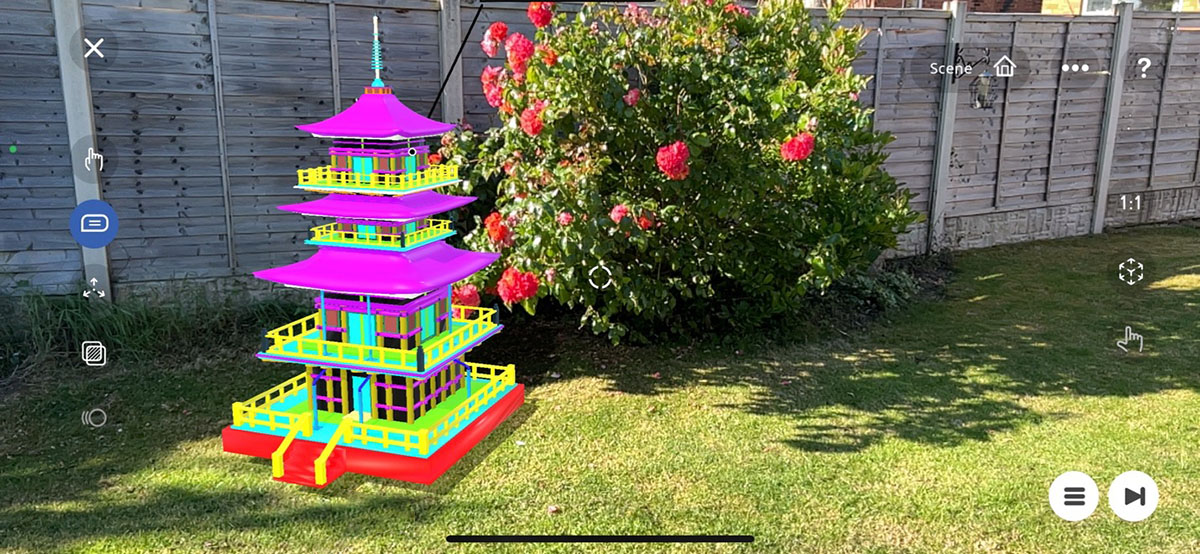
The setting of Newstead Abbey, ancestral home of the poet Lord Byron, provided further inspiration and cultural enrichment as students shared their work in the shadow of a rich literary history.
The students were also given a collection of books about Japan, to learn more about Japanese culture and traditions. They engaged in activities that supported reading and writing, such as creating Haikus and experimenting with colours and textures in artwork.
The use of augmented reality brought the students up-close to an unfamiliar culture, engaging them in new ways with the space in Newstead Abbey while also providing an authentic backdrop and genuine audience who appreciated the sights and sounds of Japan.
In previous years, the project team have been heavily involved in virtual reality and other technologies that help to bring young people with limited life experience into spaces which help them to imagine new and different places to the ones they know. The impact on their creativity, language and motivation has been evidenced and documented as significant.
Rix Inclusive Research, University of East London, and Nottinghamshire County Council look forward to future collaborations to give cultural opportunities to disadvantaged groups in new accessible and inclusive ways.
This project forms part of the Multimodal Literacy programme where over 70 students and families in Nottinghamshire and Derbyshire take part in a range of projects with ever-changing themes.
Written by Craig Wilkie
Members of purpleSTARS, Samantha Walker, Ajay Choksi, and Kate Allen have been collaborating with UCL researcher Dr Ranjita Dhital to explore the Architecture of Pharmacies and they now have an exhibition, Counter Culture, at the Bromley By Bow Health Centre.
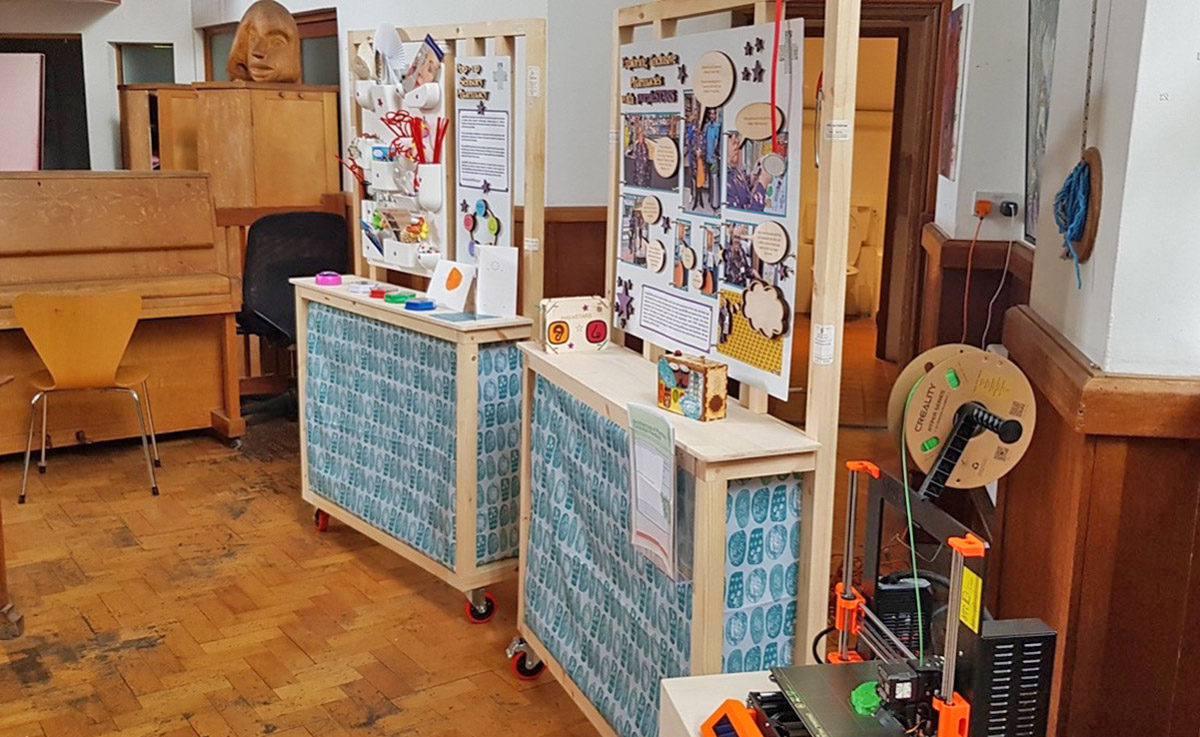
For this exhibition, purpleSTARS collaborated in the development of a pop-up sensory pharmacy and Samantha Walker shared her research at her local pharmacy. She also designed a series of artworks based on pills that were printed onto the cushions you can see below.
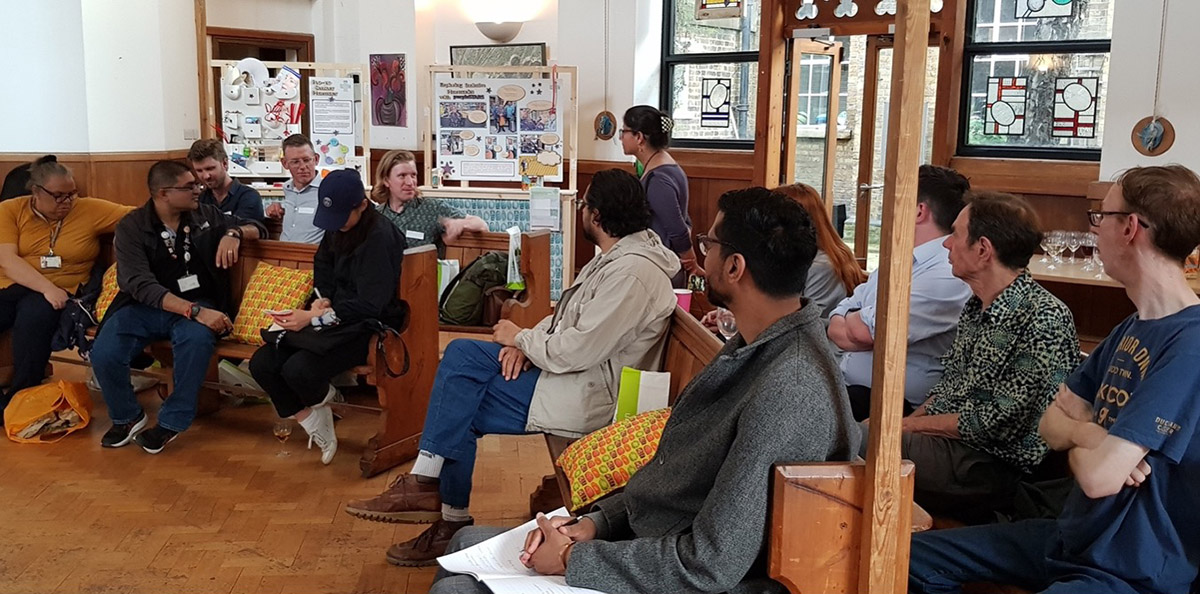
The Counter Culture exhibition also hosted a series of events for everyone to share and discuss ideas for pharmacies of the future. Ajay and Samantha contributed to the discussion and added their ideas to a white feedback coat!
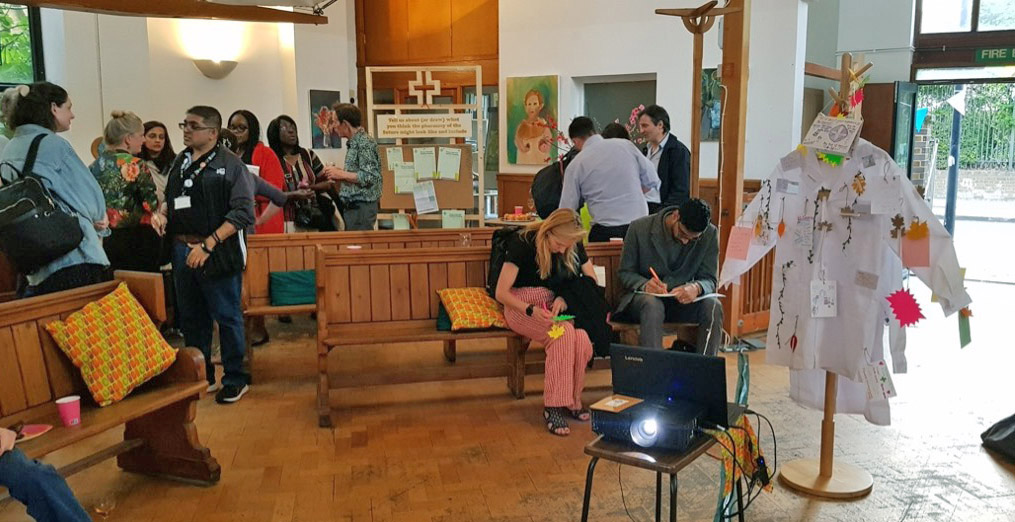
CAPA Intern Charles Stewart shared his reflections on attending one of the events, Visioning an inclusive and creative future for pharmacies.
This event provided a thought-provoking and inspiring platform to imagine a future where pharmacies play a central role in promoting health equity and inclusivity. The exhibits and discussions emphasised the need for collaboration, creativity, and a commitment to understanding and serving the diverse needs of communities.
Charles Stewart, CAPA intern
The exhibition runs until Friday 7 June 2024.
More Architecture of Pharmacy exhibition events
Review from Poplar local paper
The exhibition is part of the London Festival of Architecture.
On Wednesday 15 May, the Rix Inclusive Research team made a significant impact at the Living Well as You Get Older knowledge exchange event held at the University of Greenwich.
This event was a collaborative effort organised by the Institute for Lifecourse Development (ILD), University of Greenwich, the British Society of Gerontology, purpleSTARS, and the Rix Inclusive Research Institute at the University of East London (UEL).
The event focused on promoting health and wellbeing among older adults with learning disabilities, providing insights, resources, and inspiration to help individuals lead fulfilling lives as they age. It brought together researchers, practitioners, and community members to share knowledge and strategies for healthy aging.
The event started with opening remarks from Prof Claire Monks, Professor of Developmental Psychology and Deputy Head of the ILD. Prof Andrew Clark followed with an introduction to the British Society of Gerontology, enlightening the audience on the society’s role and mission.
We then heard from Prof Lesley Dibley and Dr Genevieve Breau about scheduling regular health check-ups, including an annual health check, and what to expect at these appointments. Their presentations underscored the importance of consistent health monitoring and what individuals should expect during their visits. An important take away from their presentation was that patients don’t always get invited for an annual health check, and therefore it is crucial to remember to contact your GP practice to book an appointment each year.
Following this, Gosia Kwiatkowska, Rix director, led a discussion with Rix co-researchers Ajay, Baljit, Kiran, and Ros. During this session, the co-researchers shared their experiences accessing healthcare services and getting their health checks. Their insights were striking, highlighting areas in need of significant improvement.

Ajay shared his experience of going to the hospital with high blood pressure and the challenges he faced during a weekend admission when no learning disability nurse was available to make reasonable adjustments for him. He had to rely on family support and felt tired and anxious, waiting the whole night before being offered a bed to rest on.
Kiran recounted an incident where a doctor spoke to her dad rather than her during a visit, asking personal questions about her body. Kiran expressed her frustration, emphasizing that as a young woman who can speak for herself, it was inappropriate for the doctor to direct such questions to her father.
Baljit had similar experiences during her health checks. Both she and Kiran felt they had to assert themselves to ensure doctors spoke directly to them, a practice that should be standard and should not have to be prompted or requested.
Ros commented on the ideal scenario where she could attend appointments independently. However, for this to happen, doctors and health services need more resources to provide easy read information and clear explanations of procedures. She also noted that appointment times are often too short for thorough consultations and that personalised information, rather than generic leaflets, would be more beneficial.
After a lunch break that featured a delightful spread of healthy sandwiches and cakes, including a traditional Indian cake made from semolina and Greek yogurt by Kiran’s mum, the event continued with a presentation by Dr Amanda Amorim Adegboye on healthy eating and maintaining a nutritious diet. Dr Adegboye highlighted the importance of understanding food labels and identifying healthy alternatives, emphasising that appearances can be deceptive.
The co-researchers also shared tips from a leaflet they produced, Tips for living well, on making healthy food more interesting and motivating people to eat healthily. The co-researchers brought their favourite spices, a motivational drinking bottle to encourage hydration, and a healthy eating plate to help balance different food groups.
The Living Well as You Get Older event was a great success, thanks in large part to the contributions of the Rix Inclusive Research team and the participants from purpleSTARS. Their collaborative efforts showcased how inclusive research can effectively promote health and wellbeing among older adults. The posters created by Kiran, Baljit, Ros, and Ajay will hopefully inspire and motivate individuals to take proactive steps towards healthier living as they age.
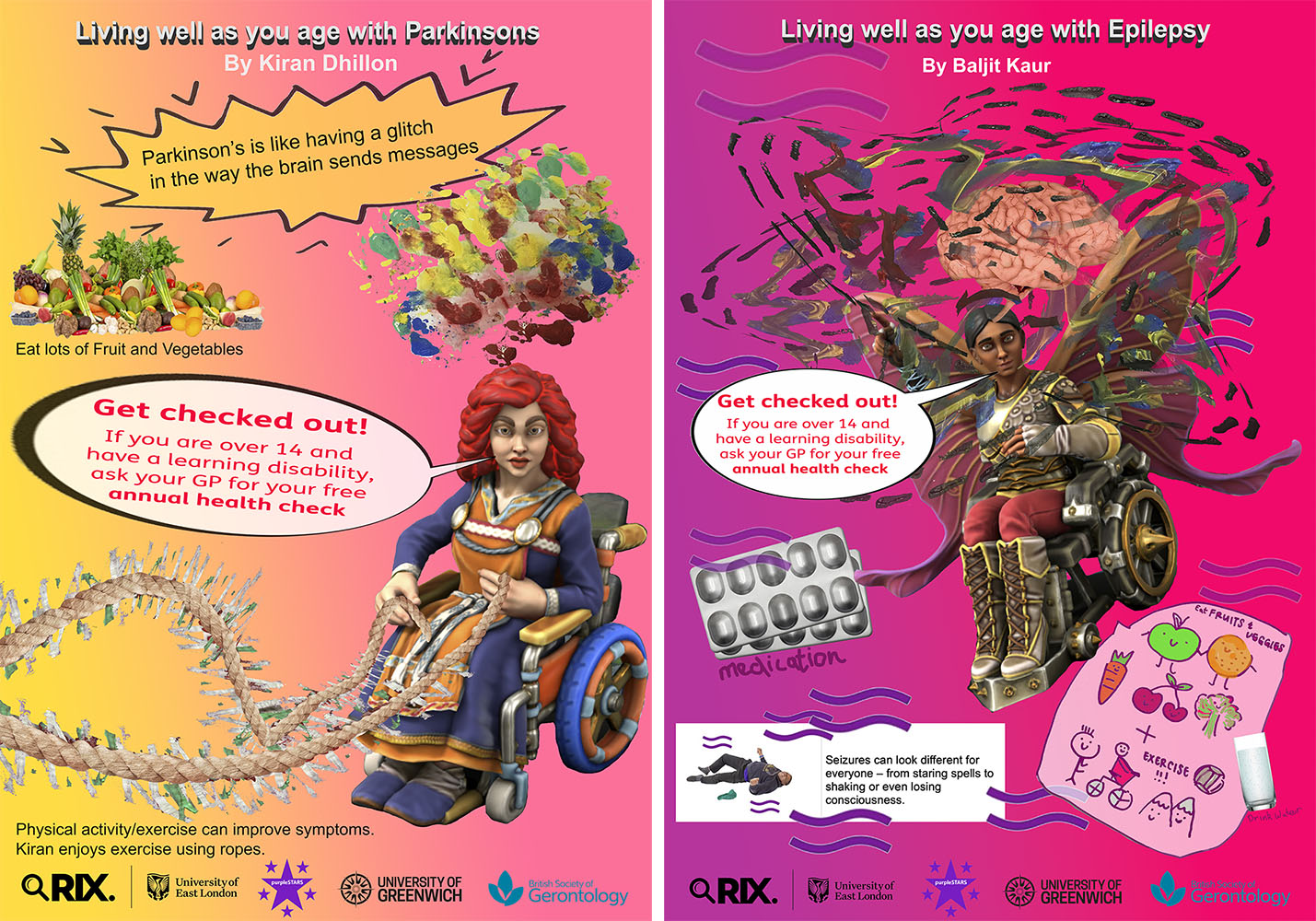
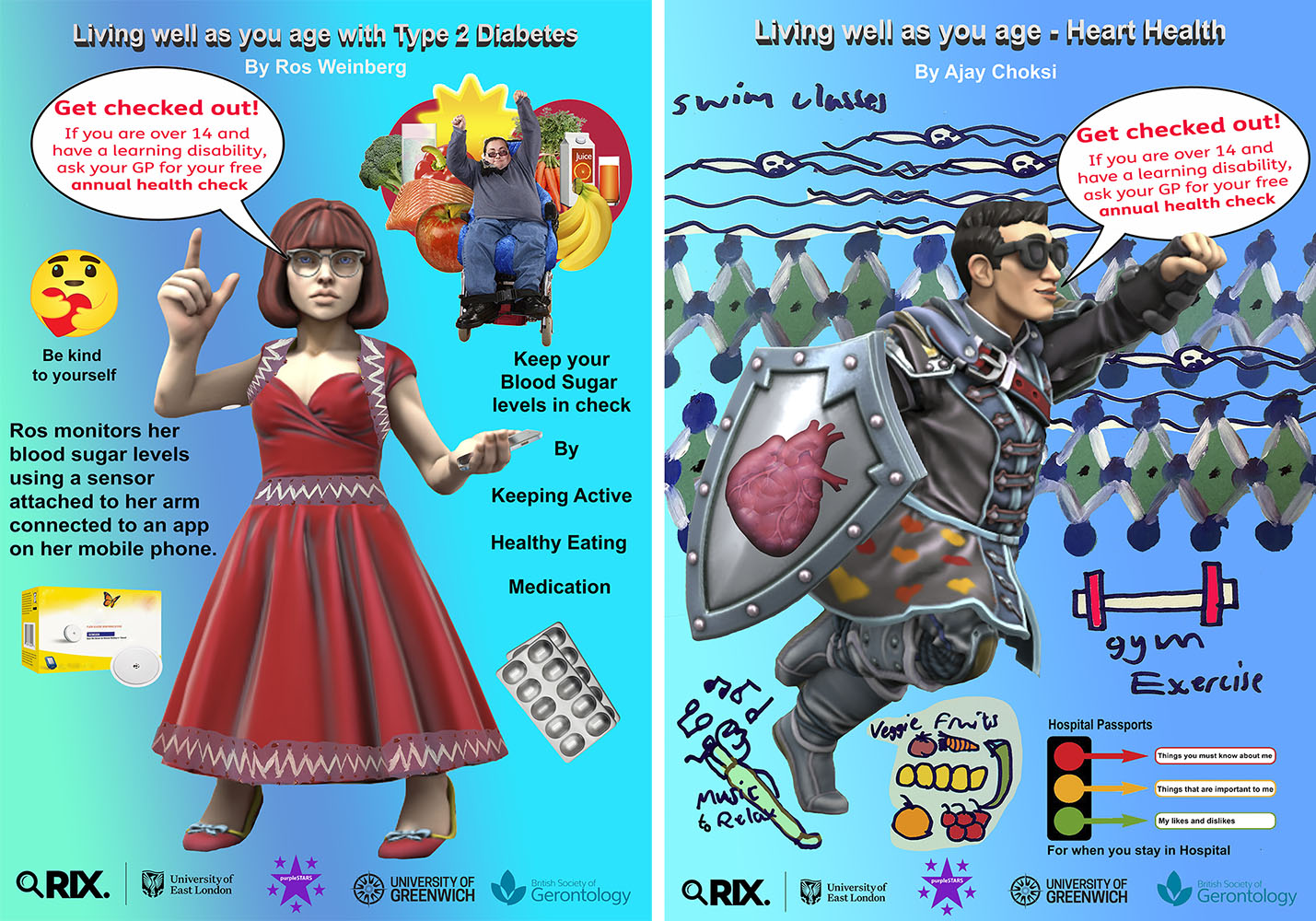
As we reflect on this event, it is clear that fostering inclusive research and community engagement can lead to meaningful and impactful outcomes. The Rix Inclusive Research team’s dedication to making health information accessible and engaging is a testament to the power of collaboration and the importance of supporting healthy aging for all. We are now planning our exhibition which will take place in late July 2024. Watch this space, and in the meantime, visit our project wiki,
Living Well As You Get Older wiki
It’s hard to believe that only a week ago we were all together in the Royal Docks Centre for Sustainability celebrating 20 years of Rix.
Our 20th anniversary event on Wednesday 1 May, RIX 20!, was a resounding success and was attended by over 120 people, a lively mix of academics, practitioners, people with lived experience of disability, and co-researchers. There was a buzzing atmosphere of inclusion, we were all equal in the room, and this created a real feeling of community and connectedness.
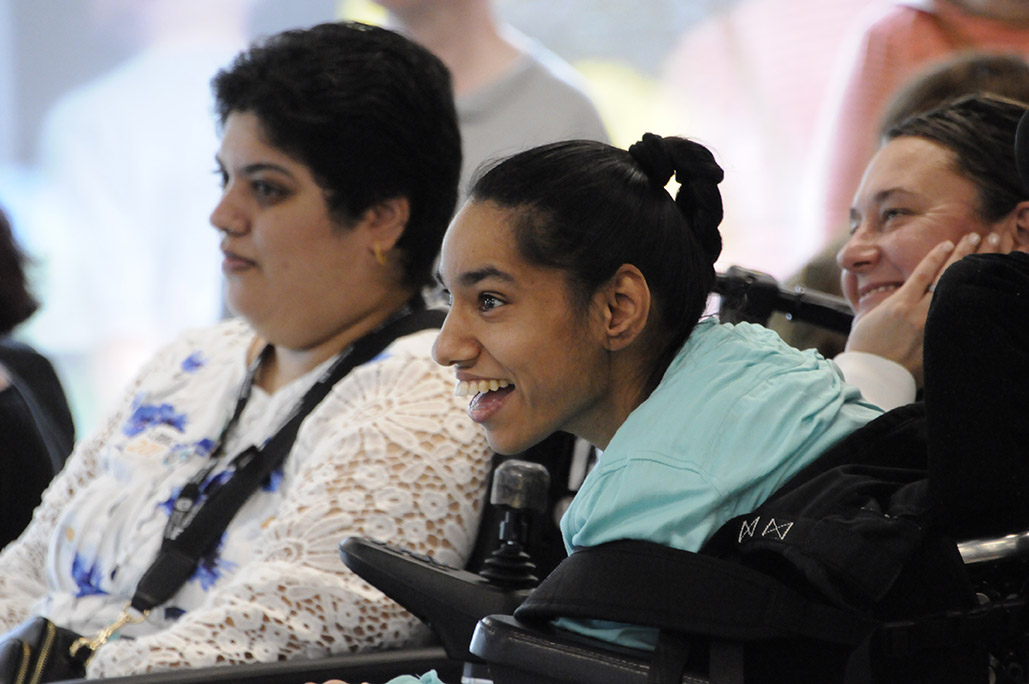
After opening remarks from UEL vice-chancellor and president Prof Amanda Broderick, we were treated to a trip down memory lane with Andy Minnion and Jonty Rix, son of Lord Brian Rix who co-founded the Rix Centre with Andy. They chatted about the challenges along the way and the early experiments with multimedia that would develop into the Multi Media Advocacy approach and the Rix Wiki.
Jane Abraham and Catherine de Haas spoke touchingly about their friend Gloria Ferris and we all admired Gloria’s lovely knitted tea cosy.
Nicola Grove from the Rix team talked about the meaning and purpose of storytelling and shared some videos of interactive story making sessions at Charlton Park Academy.
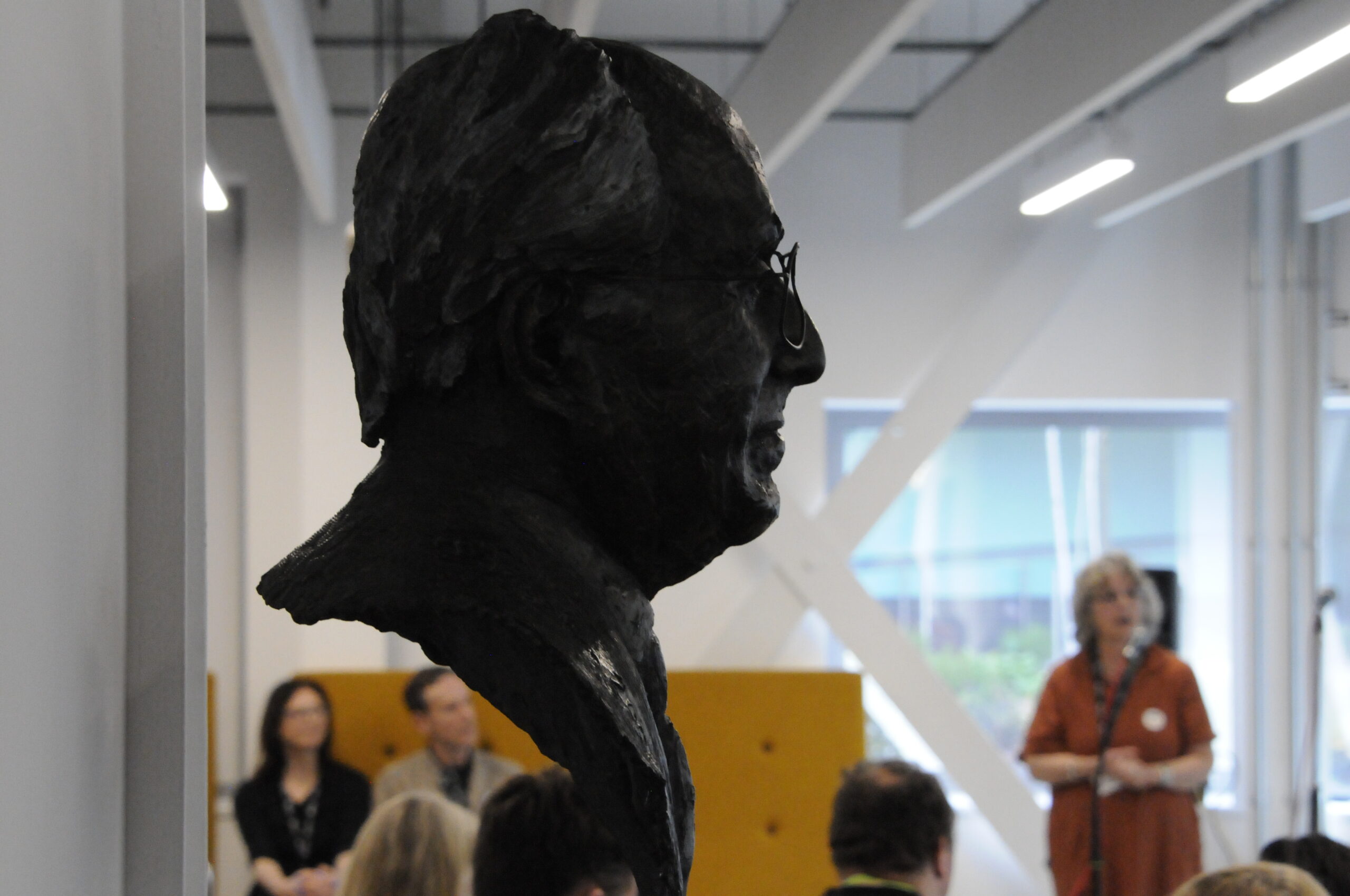
The highlight of the morning was undoubtedly the mesmerising Diabolo performance from Oskar Schenck who had brought along his mum Stana as interpreter and his brother Jakub to capture the event on his phone. Oskar gave a confident and skilful performance with his blue Diabolo set and had the audience gasping with wonder at some of his moves.
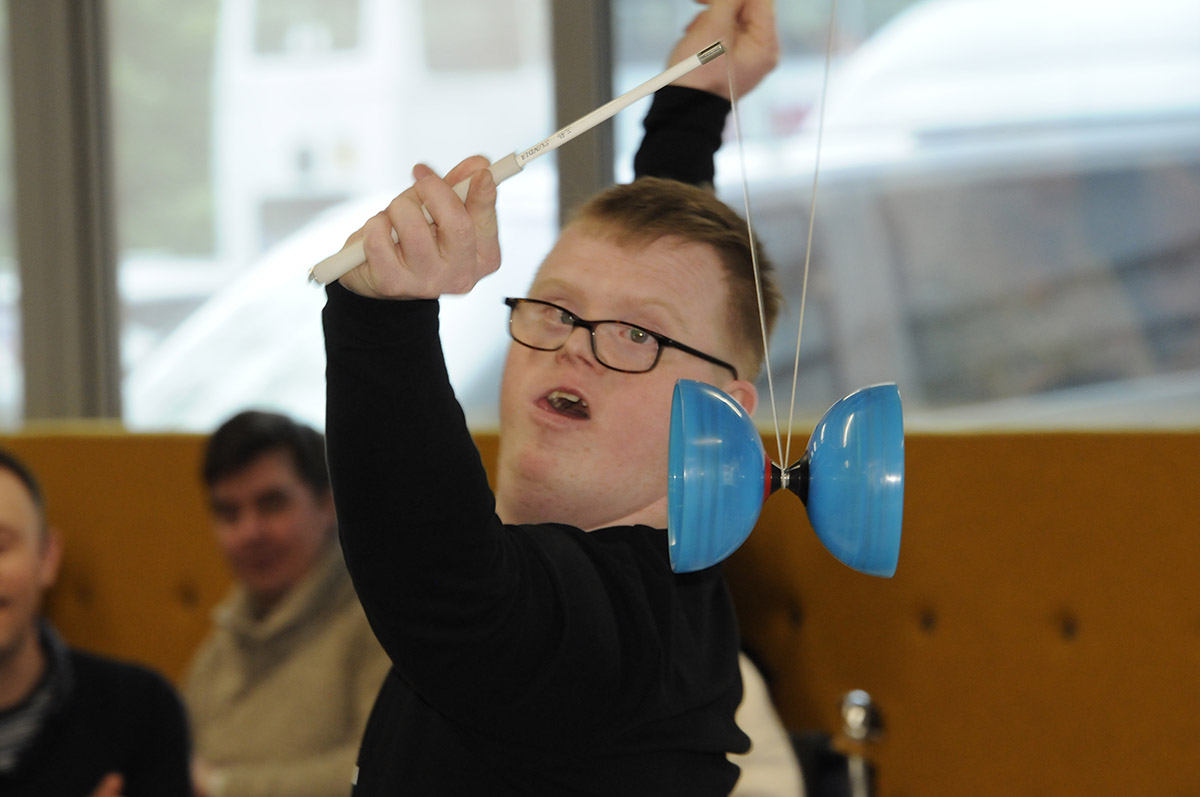
During and after lunch there were a series of workshops for people to enjoy before coming back together for a delightfully sweary presentation from Not Your Circus Dog Collective! who have been touring their cabaret show, Not F**kin’ Sorry! Many thanks to the show’s co-writer and director, Liselle Terret, for supporting the troupe with their brilliantly outrageous performance.
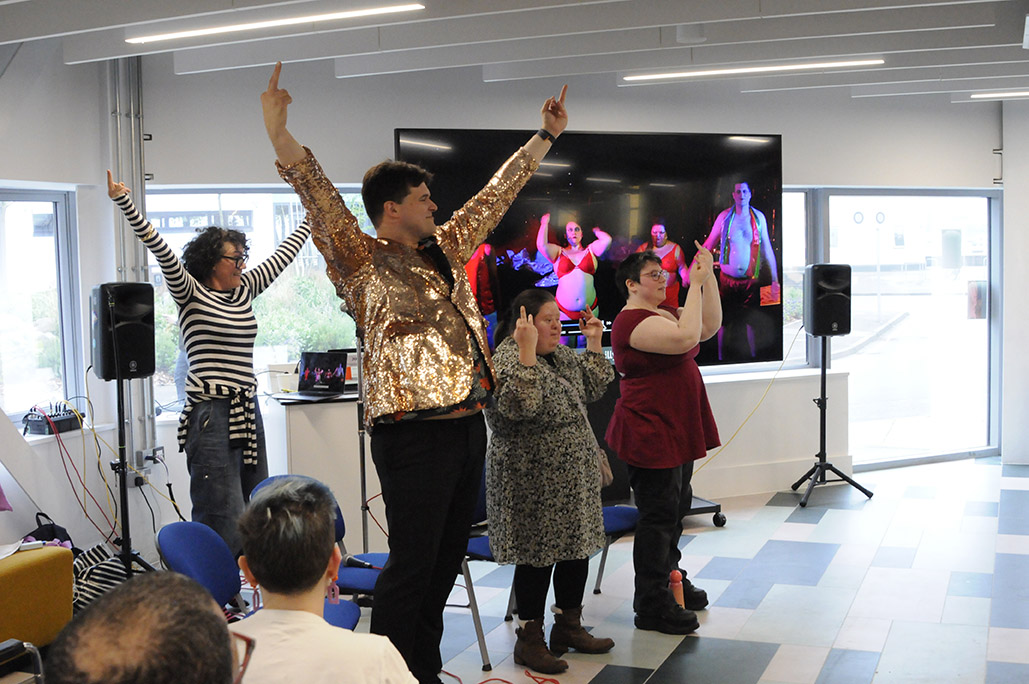
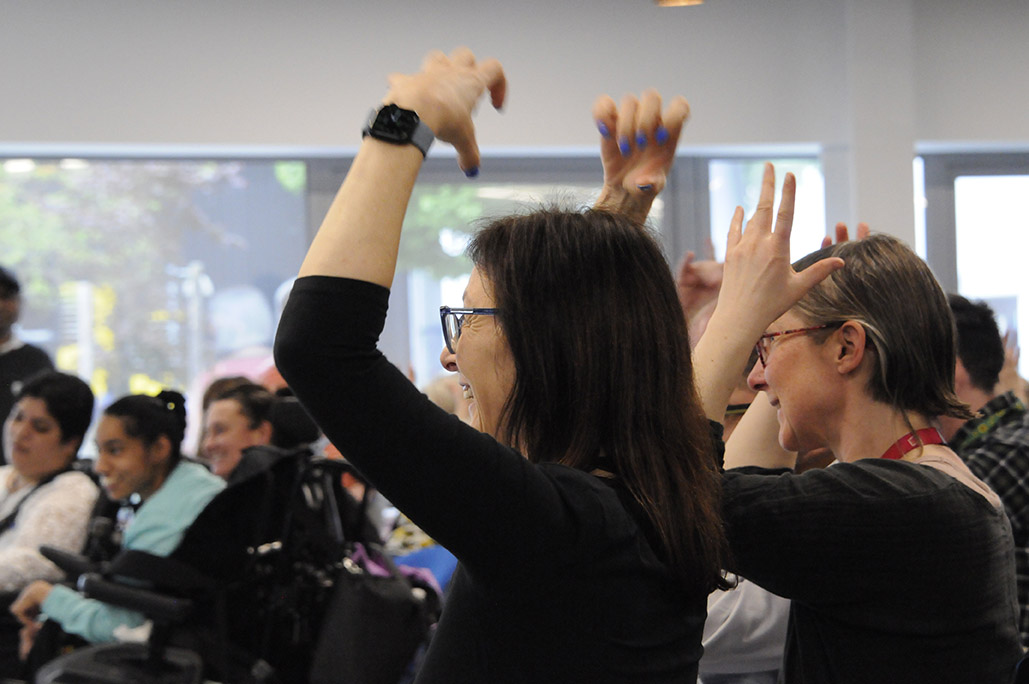

The event ended with the book launch for Rights in Practice for People with a Learning Disability: Stories of Citizenship. Liz Tilly and Jan Walmsley talked about how they came to write the book and invited several of the people whose voices are captured in the book to talk about their experience. Our Rix co-researchers, who had co-written a chapter about employment supported by Gosia Kwiatkowska and Kanchan Kerai, also shared their experiences with the audience.
The Rix team would like to thank all of those who attended RIX 20!, including the stall holders with their share and tell tables, the amazing performers, all our friends from the local community, and the UEL staff and social work students who helped us with the event. 25 here we come!
At the Rix Inclusive Research Institute, members of our team, Ajay, Kiran, Ros, and Baljit, supported by Kanchan and Gosia, recently took a deep dive into a shocking paper by Prof. Jonathan Rix, published in the British Journal of Learning Disabilities.
Jonathan Rix’s insights into the derogatory use of terms like moron, idiot, and imbecile in media narratives sparked an intense discussion amongst us. Shocked to learn that such outdated and offensive terms are still prevalent, we resolved to address this critical issue head-on.
In our quest to delve deeper into these findings, we spoke with Dr Abigail Croydon from the University of Southampton – see video below.
A conversation with Dr Abigail Croydon
This conversation further illuminated the pervasive nature of such language in the media and its damaging impact on the dignity of people with learning disabilities.
Motivated by our discussion, we invited Jonathan Rix to a LinkedIn Live session where Ajay and Ros asked him about practical steps we can take to combat these harmful stereotypes. His insights were invaluable, guiding us towards initiating a focused campaign aimed at eliminating such language from media discourse.
We are now vigilant. We monitor media outlets and we are prepared to write to publishers whenever we encounter these disparaging words. Our message is clear: these terms, historically used to marginalise and insult people with learning disabilities, have no place in today’s society. It’s time for change, and we are committed to making this change happen.
Ros poignantly captured how we all felt by saying, “Label jars, not people.” This simple yet powerful statement embodies our belief in the dignity of every individual and our commitment to fostering a more inclusive society.
We invite everyone to join us in this endeavour. Start by reading the insightful article and watching the easy-to-understand video accompanying it. Together, we can influence a shift towards more respectful and mindful language in the media, ensuring a more inclusive world for all.
Read the article and watch the video
Your awareness and action can make a significant difference. Let’s stand together against derogatory language and advocate for respect and inclusion in every aspect of society.
Written by Gosia Kwiatkowska
We are celebrating 20 years of Rix by hosting Hackathon20 at the Royal Docks Centre for Sustainability on Friday 12 July 2024.
Our ambition is to work with business leaders, heads of services from the public sector and our co-researchers (a community of research experts with a lived experience of a learning difficulty) to identify 20 challenges people face in the health and wellbeing sector.
This event is funded and supported by the Centre for Wellbeing Community and Inclusion (CWCI) at the University of East London.
The Rix hackathon promises to be a fun, inclusive and solution-focused interactive workshop, where people from different walks of life and experiences work together to share their ideas and experiences to solve problems. Whilst some attendees will have a technical or developer background, this is not a prerequisite of attendance. Creativity, ambition and resilience are the order of the day.
Rix believes that some of the biggest challenges people face can be overcome with solutions that are closer to home than we thought possible. By exploring these solutions we can all contribute to a more inclusive society, where people’s lives are transformed, and businesses and orgnaisations deliver better, more efficient services.
The event will take place in the Royal Docks Centre for Sustainability (RDCS), at the University of East London’s Docklands campus.
Date: Friday 12 July
Time: 10.30am to 5pm
Limited spaces available!
* Whilst there is no charge for this event, we kindly ask that you use the Eventbrite booking system to reserve your space. Refreshments and lunch can only be provided to those who have booked using this process. Booking via Eventbrite is also a requirement for UEL staff and students.
purpleSTARS were asked to share our inclusive research methods and sensory objects at the Newham Citizen Science Fair. Co-researchers Ajay Choksi, Samantha Walker, and Kate Allen exhibited some of the sensory museum labels we co-produced, inspired by objects in the British Museum’s Enlightenment Gallery.
People enjoyed experiencing our research, it was very enjoyable sharing ideas with young people!
Ajay Choksi, co-researcher
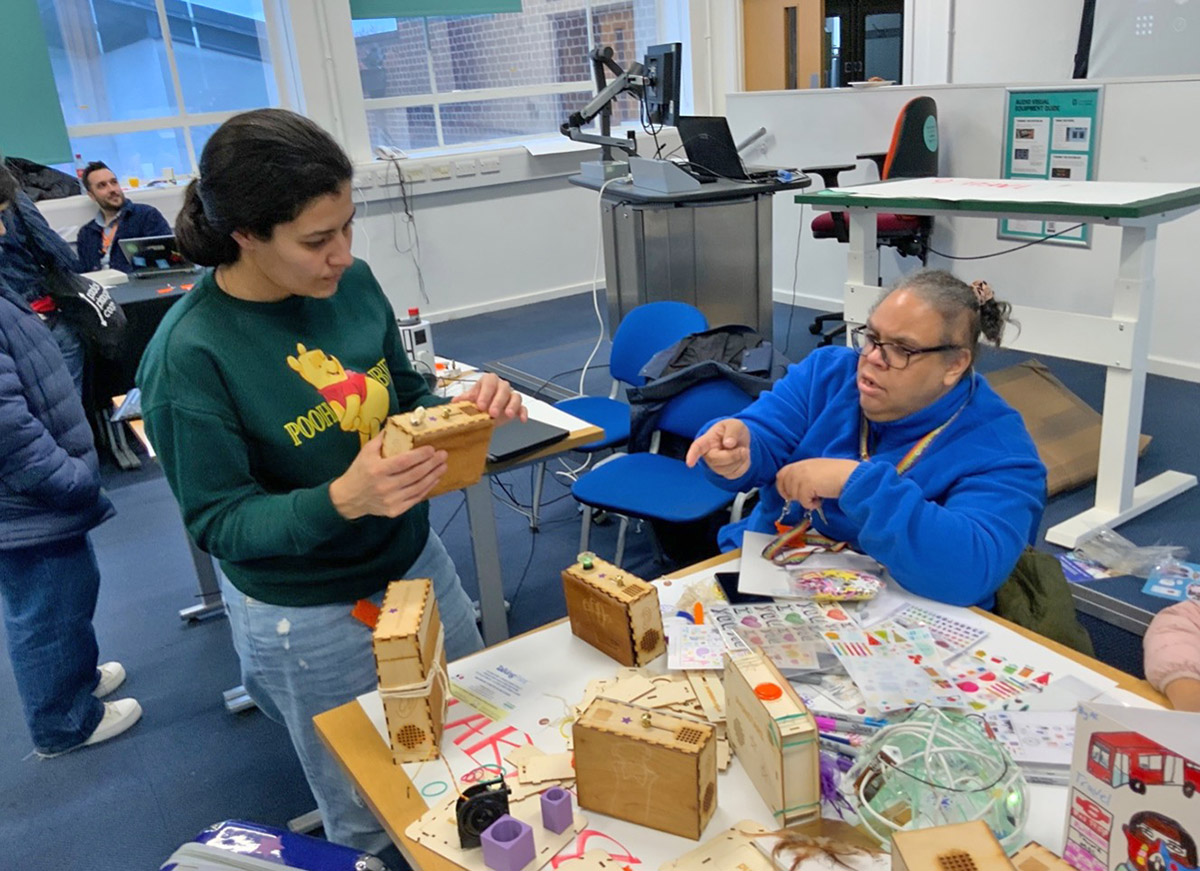
Our first design experiments creating a multi-sensory museum label used sound recordable cards. Each co-researcher chose an object from the museum collection and drew images, found sounds, textures etc to create a sensory experience of the item. From these beginnings we developed the sensory label creating laser cut wooden boxes with engraved drawings, smell chambers and micro controllers to trigger soundscapes.
At the Fair we offered visitors the opportunity to create a sensory museum label about something important to them, that they wanted to share with people in the future. Visitors were given a recordable card on which they could develop their ideas for a sensory label through drawing, text, and adding texture.
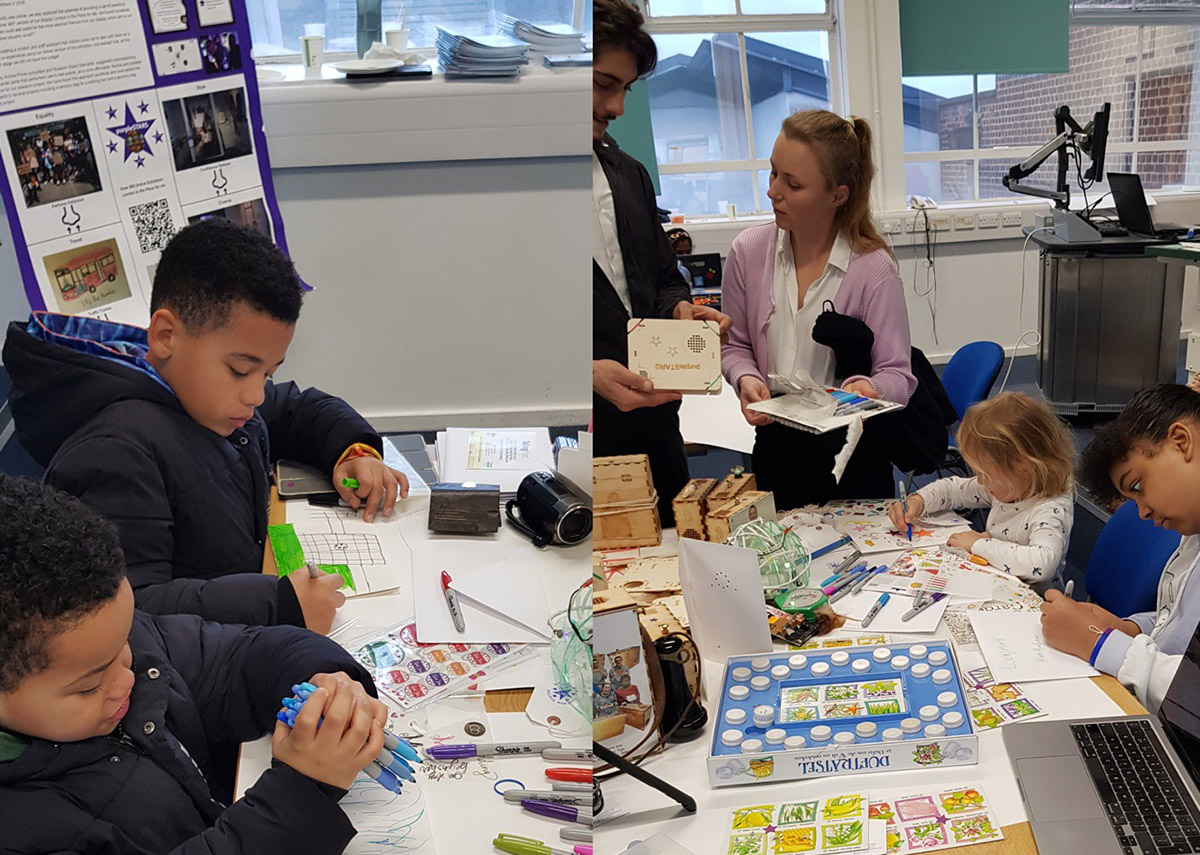
Visitors also helped our research to create an easy-use, self-assembly DIY version of our sensory label by having a go at assembling a prototype of the DIY kit.
I enjoyed today helping the children at the science fair making the cards. It was fun.
Samantha Walker, co-researcher
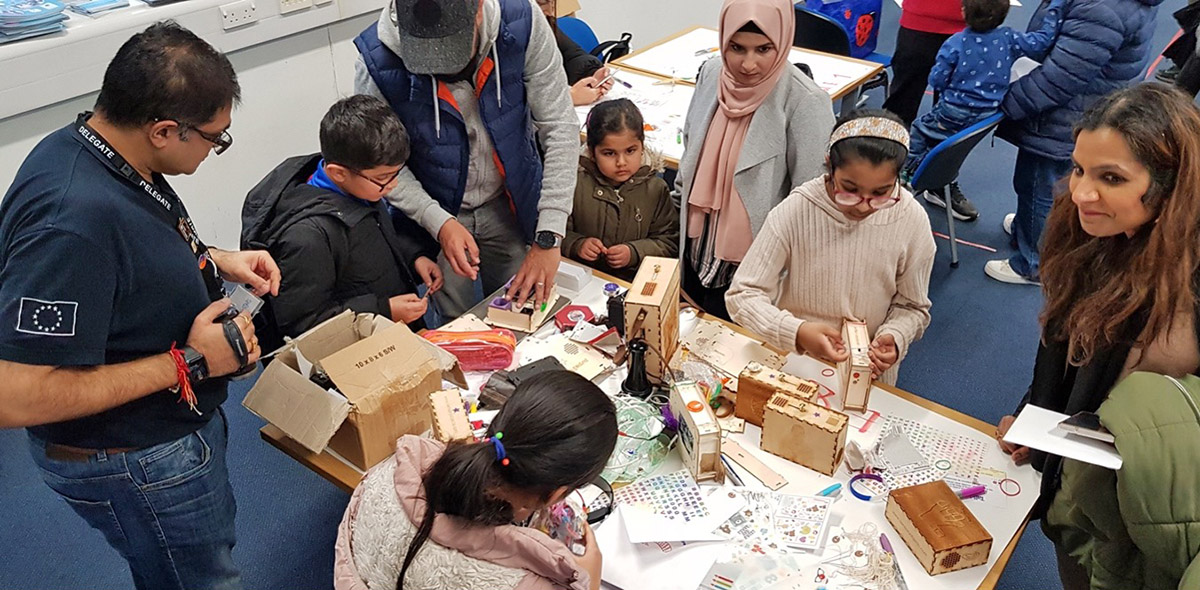
Science Fair attendees also engaged with some of our other action research methods, exploring the sense of smell through a game of smell bingo and telling a sensory story to be recorded for our Suitcase Stories.

We also displayed our smell research poster with a QR code for a 360 online exhibition, London is the Place for Me, developed from listening to oral histories of past Londoners, co-produced for the Museum of London. We are researching the potential of offering accompanying scents/smells for virtual exhibitions and museum displays, which led us to ask the question, “How does equality smell?”
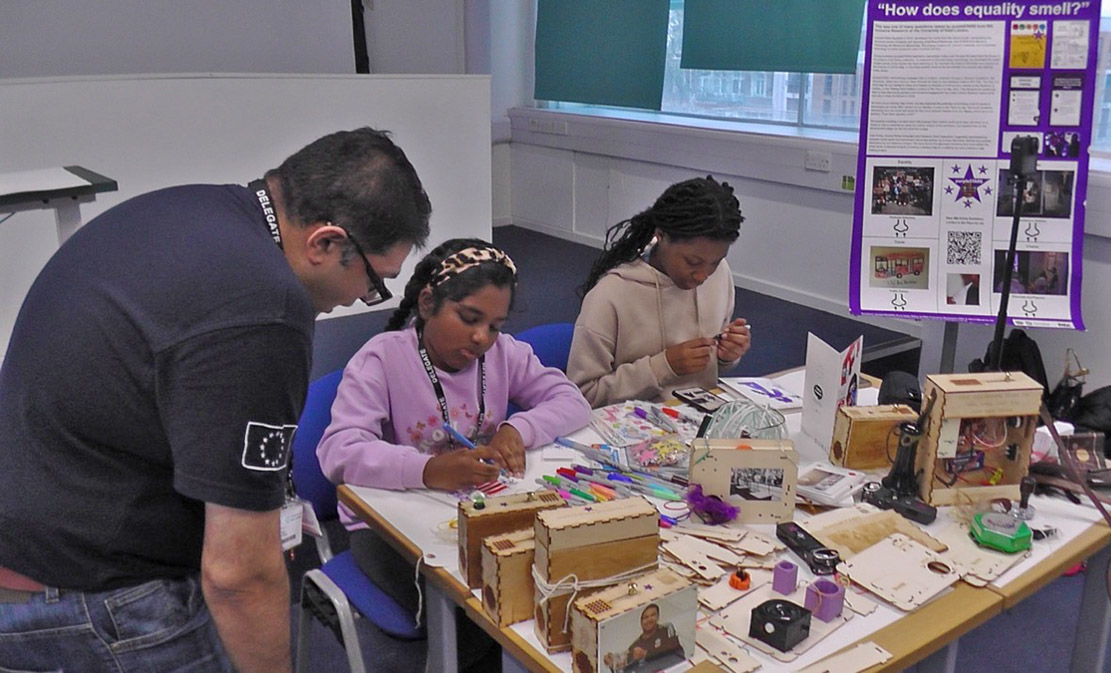
We met Des Blake, a Newham resident and member of The Hackney and Newham History Social Club.
Hackney and Newham History Social Club
Des recorded his thoughts on one of our sound recorders and gave us some great feedback.
“This table is really good news for me, because you don’t normally see this sort of sensory event going on at a science event.”
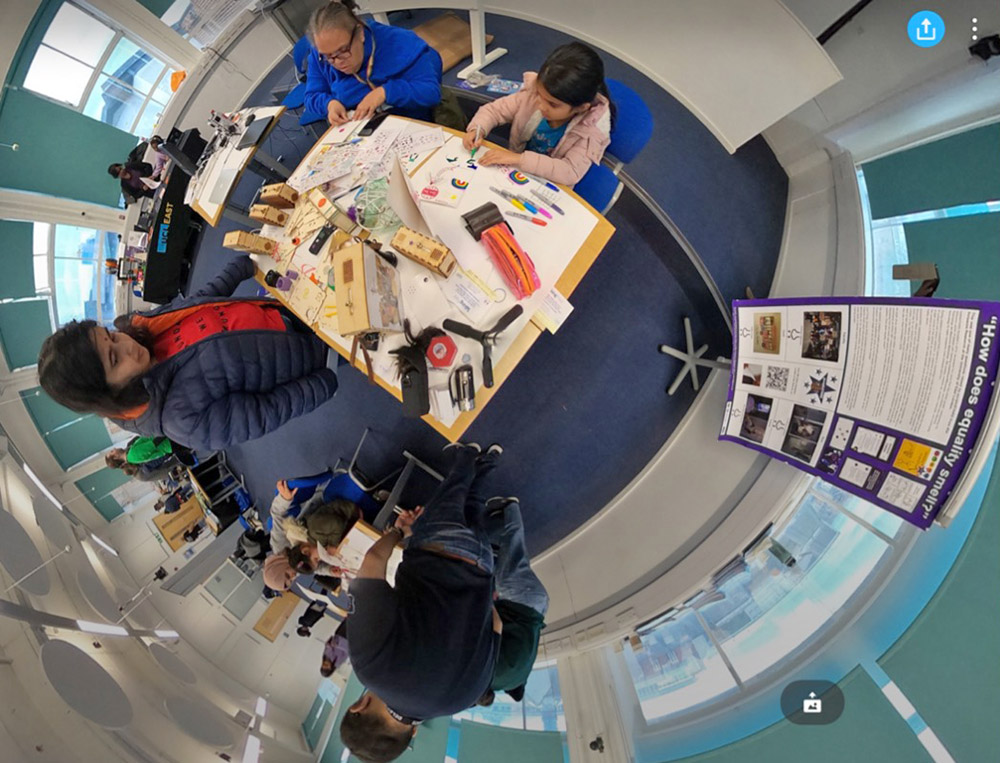
Hear from Des in this video and see some other visitors at work, creating sensory museum labels on the day.
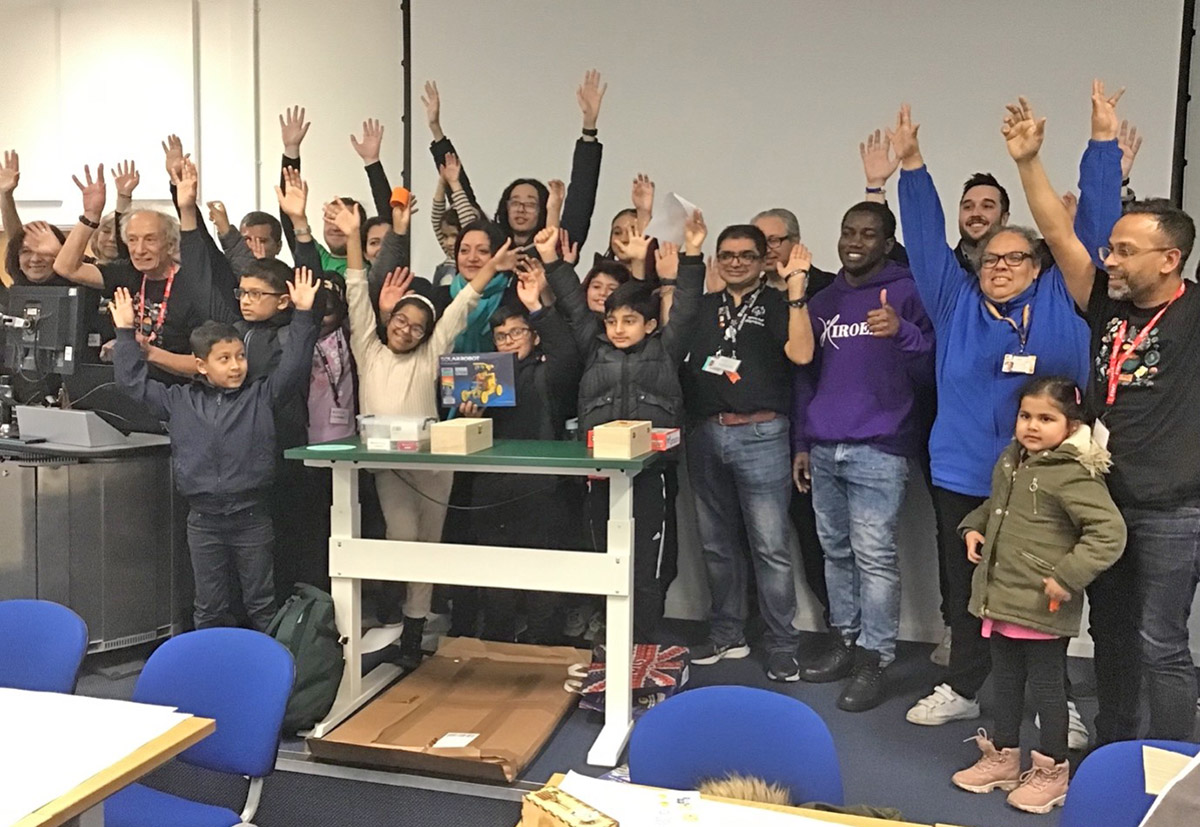
It was a great day, we showed all our sensory and micro controller technology research, creating sensory museum labels and much more
Ajay Choksi
Written by Ajay Choksi
Pictures Ajay Choksi and Kate Allen
Edited by Kate Allen
In our recent collaboration with The National Archives, Natalie and Sarah from the Education Department visited our newly established office at the Royal Docks Centre for Sustainability on January 30, 2024. Building on insights gathered from our previous trip, this feedback session sought to develop strategies to enhance the accessibility and inclusivity of the collections at The National Archives.
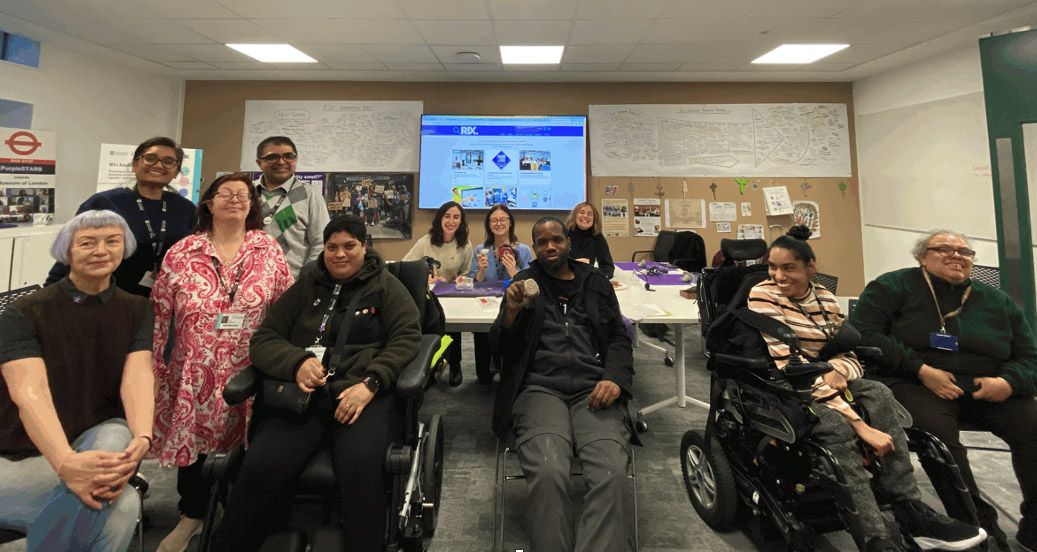
In close collaboration with our co-researchers with lived experiences and purpleSTARS, this session explored alternatives to ensure that the museum exhibits cater to diverse sensory sensitivities. The discussions centred around creating an environment where historical artefacts and exhibits can be appreciated by everyone.
After our previous trip to The National Archives, we explored innovative ways to share items from the collection with sensory dimensions. Using materials such as coconut husks and old books, visitors could better understand historical artefacts with an interactive experience. Drawing inspiration from previous collaborations with museums, sensory boxes and virtual experiences were also explored as alternatives to the museum experience.
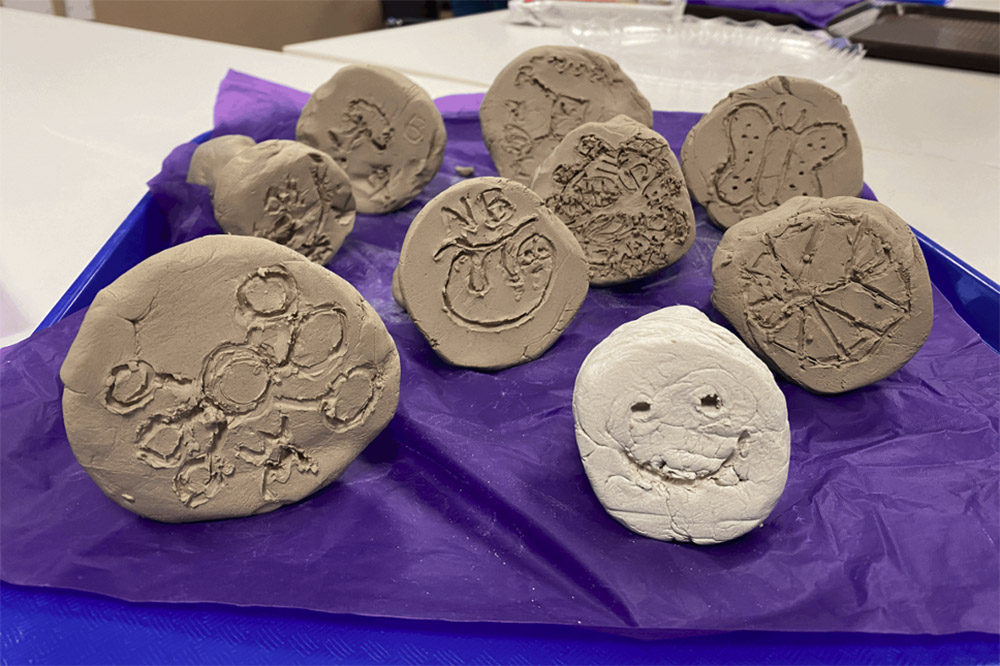
The incorporation of easy read materials, audio experiences and hands-on activities also emerged as key strategies to make historical information inclusive. We also tried our hands at designing our own seals, a replication of the historical seals shown at The National Archives. This hands-on activity not only provided active engagement with historical materials but also added a personal twist to the museum experience.
By including sensory experiences in the museum experience, we hope to make historical information accessible to a broader audience. We recognise the importance of empowering individuals through knowledge, especially for individuals with sensory sensitivities.
What was one important thing you learnt from the session?
After visiting the National Archives, I realised the importance of keeping the old collections safe. It provides us with an understanding of where things come from, who they belong to, who they are for, and what is their purpose.
There were lots of old collections such as old files, books and stamps that are important to understand history.
What was your favourite moment from the session?
My favourite moment is seeing and recreating the seal stamps, as it reminds of putting stamps on letters and leaving a signature.
I enjoyed creating my own seal with purpleSTARS, designing and incorporating the Wiki design into my seal.
Have you got any tips for The National Archives to make it more accessible?
A lot of the collections were hard to read because they were in a different language, so translation into English is needed.
Some of the old letters and files were also in different formats and handwriting, which made it challenging to read. Having an easy read version would make it more accessible for everyone.
What worked well about the session and what didn’t work so well?
The session worked well as we were able to come down to visit the old archives, which were kept safe and secure. There were staff members that showcased the collections, allowing us to get a better glimpse and understanding of the materials. This helped us with coming up with ways to improve the accessibility of the materials.
Written by Synne Lim